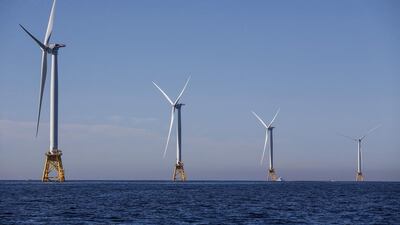Green bond issuance rose 40 per cent to $47.2 billion globally in the first quarter of 2019 backed by strong corporate issuers, according to Moody's.
Green bonds are financial instruments structured to fund schemes relating to climate change and the environment. Issuances, particularly sizeable ones from Europe, have increased as institutions such as the EU push for green bond standards to finance sustainable growth.
Around $15.9bn worth of green bonds were corporate, accounting for roughly a third globally. Non-financial corporate issuance contributed 17 per cent to the overall issuance accounting for $8.1bn.
"Green bonds accounted for 2.5 per cent of total first-quarter global bond issuance, up from 1.7 per cent in the first quarters of both 2017 and 2018. We expect this trend to persist in the long run as the market continues to mature," Moody's said in a report.
Sustainable finance, which includes instruments such as green bonds, sustainable development goal bonds and social bonds accounted for about 1 per cent of the total global bond market last year, according to HSBC. Overall bond issuance in 2018, including sovereigns and sub-sovereign issuances in all currencies, reached about $19.4 trillion. Green bonds reached a total of $167bn during the period, a 3 per cent year-on-year increase, while social bonds came in at $35bn at the end of last year, data showed.
First quarter growth in green bonds was led by Europe, contributing about half of total issuance, followed by North America at 30.7 per cent and Asia-Pacific accounting for 15 per cent.
Around $8bn of issuance came from France alone, Moody's noted, supported by large issuers such as the government-backed Societe du Grand Paris, which brought €2.1bn of green bonds to market in three tranches. A €2bn tranche was issued in March. The French government also issued a €1.7bn in February, making it one of three sovereigns apart form the Polish and Indonesian governments, which issued €2bn and $750m green bonds respectively, in that quarter.
Issuance by development banks declined, accounting for just 5 per cent, while non-financial corporate issuers brought green bond tranches of $1bn or more to market during the first three months of the year. Among the biggest issuances include a $1.5bn green bond by the MidAmerican Energy Company. Telecoms firms also contributed to the green bond market with Spain's Telefonica putting out a $1.2bn green bond offering as well as a $1bn issuance from US firm Verizon in February.
Verizon’s offering illustrated pent up demand for sustainable finance, analysts said at the time, with orders eight-fold larger than the $1bn in debt sold. The issue was the first such green bond from an American telecom company and came weeks after the Telefonica bond - the telco sector’s first green bond issue.
Moody's noted however that while there's appetite for green bonds, the green sukuk segment remained fairly untapped. Issuances in the sector have largely been led by sovereign and corporate issuers based in Malaysia. Sharia-compliant offerings within the green bond and sukuk market remained fairly negligible at less than 1 per cent.
A total of $592bn in green bonds have been issued worldwide, according to Bloomberg New Energy Finance.
The slow pace of growth in the green sukuk market is relative to the size of the sharia-compliant bond market, which is fairly small despite growing 5 per cent to $119bn in 2018.
In the first quarter of 2019 however, the Indonesian government issued a $750m tranche of its $1.25bn five-year sukuk, the first sovereign issuance of its kind, which was brought to market in February 2018. Proceeds from the issuance will be used to largely finance schemes in renewable energy, sustainable transport, waste management and green buildings.


